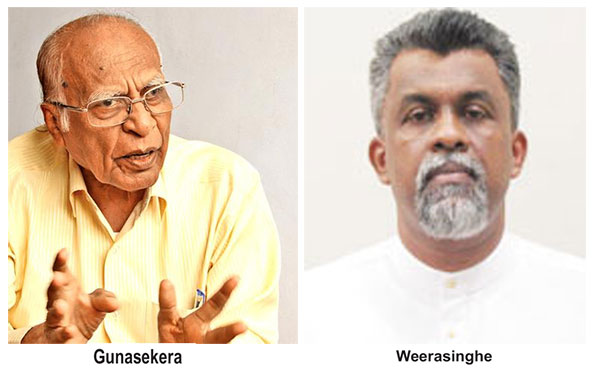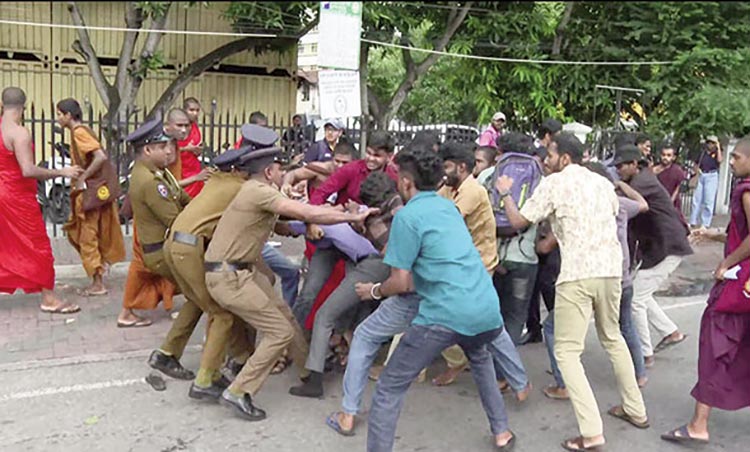News
Group of Four affiliated to SLPP manipulates paddy prices, says DEW

Weerasumana warns of fresh youth unrest
by Shamindra Ferdinando
Former Minister DEW Gunasekera has alleged that the four major millers representing the interests of the ruling Sri Lanka Podujana Peramuna (SLPP) decides the price of rice, according to the Communist Party organ, Aththa (13 Feb).
DEW Gunalasekera last represented Parliament on the UPFA National List in 2015.
Addressing the Matara District Convention of the Communist Party recently, the one-time General Secretary of the party Gunasekera explained how the group of four bought about 46 percent of the total paddy production, hoarded and then released the stocks to the market a year later, thereby retaining the capability to decide the market prices.
The veteran politician said that the public were aware of the real reason for the crisis in the market due to manipulation of the market.
The Cabinet of Ministers on 27 Sept. last year removed the price controls imposed on rice, rescinding the previously issued Gazette Notification on maximum retail and wholesale prices of rice.
The former lawmaker, who had led the Committee on Public Enterprises (COPE) investigation into the Treasury bond scams perpetrated in 2015 February, told the CP gathering that corruption could never be eliminated. However, waste, corruption and irregularities could be controlled, the ex-MP said, underscoring the failure on the part of those responsible to correctly identify the daunting challenges faced by the country.
Pointing out the economic crisis experienced by the US economy, the former minister emphasised that both the US and Sri Lanka printed money excessively though our currency wasn’t acceptable for international trade.
Gunasekera stressed that the national economy was in bad shape as a result of the preparation of fiscal policies by successive governments to suit new-liberal strategies. Declaring the current crisis as the worst ever since the country gained independence over seven decades ago, Gunasekera advised the government that the overwhelming crisis couldn’t be resolved by printing money.
According to available official records the government during 2021 has printed a staggering Rs 678.33 bn.
Gunasekera urged the government to take tangible measures to enhance government revenue or face the consequences. The CP veteran recalled the relevance of the economic proposals once proposed by Dr. S. A. Wickremesinghe. The former Minister regretted that the crisis hasn’t resulted in a wider discussion involving all stakeholders as well as the public.
CP member Weerasumana Weerasinghe said that their party, too, was responsible for exploring ways and means of addressing current challenges.
Matara District MP Weerasinghe said that the country paid a huge price for wrong economic policies pursued by successive governments. The CP contested the last general election on the SLPP ticket. However, the CP could win only one seat whereas the promised National List was not given.
Pointing out that the growing unemployment posed quite a threat, lawmaker Weerasinghe said that the Matara district was the worst affected. Emphasising the urgent need to address the issues at hand, MP Weerasinghe said that the failure on the part of those responsible to address unemployment could create a dangerous situation. Referring to JVP-led insurgencies in 1971 and 1987-1990, MP Weerasinghe stressed the need to address the grievances of the youth.
When The Island asked ex-Minister Gunasekera whether he could name those who fixed the market prices of rice, he said there were two Polonnartuwa- based businessmen, in addition to Dudley Sirisena and State Minister Siripala Gamlath.
Gunasekera alleged that the government has caused a catastrophic situation by taking hasty decisions on matters of importance. The ban on fertiliser and agro chemicals was a glaring example of bad decision making, the former CP General Secretary said.
News
FSP asks govt. to pull out of defence deal with India

The Frontline Socialist Party (FSP) yesterday demanded an immediate termination of what it called a “secretive and dangerous” defence agreement signed between Sri Lanka and India, during Indian Prime Minister Narendra Modi’s 05 April visit.
Addressing a press conference at the party’s headquarters in Nugegoda, FSP Education Secretary Pubudu Jagoda described the agreement as a “betrayal of the nation” and a “crime against the people,” urging the government to invoke Article 12 of the deal and exit it with the required three months’ notice.
Jagoda said the document, which surfaced on social media after being published by a news portal, appears to be the actual agreement signed between the two countries. “The government has not denied its authenticity. That silence is telling,” he said.
Jagoda added that the agreement bears the signatures of Sri Lanka’s Defence Ministry Secretary Sampath Thuiyakontha and Indian High Commissioner Santosh Jha.
“What’s most troubling,” Jagoda warned, “is that both governments attempted to keep the agreement under wraps. Unlike the 1987 Indo-Lanka Accord, which was made public with all annexures, this agreement was hidden from the people, and even now, we don’t know how many other agreements exist between India and Sri Lanka.”
Jagoda said that a Right to Information request made on 04 April was met with a reply from the President’s Office stating that it had no copies of the agreement—raising serious concerns about transparency, even at the highest level. “One could question whether the President has seen it because his office does not have it,” Jagoda said.
The 12-clause of agreement reportedly covers areas such as exchange and training of military personnel, defence industry collaboration, classified information protection, and military medical services, including battlefield healthcare and telemedicine.
Jagoda said the definition of “classified information” in Clause 7 was alarmingly broad. “It allows India to label virtually anything as secret. Even weapons or military assets transferred under this agreement cannot be revealed—not even after the agreement ends,” he said, citing Clause 7.3.
Clause 10 prohibits either country from taking disputes to international courts or involving third-party mediators. “It’s like asking a rabbit to negotiate with a tiger,” Jagoda quipped, drawing parallels to the complications of the 1987 accord, which eventually saw Indian peacekeeping troops refusing to leave until a change in the Indian government.
Jagoda accused the NPP-led government of hypocrisy, pointing out that the JVP, the main component of the current regime, had vehemently opposed Indo-Lanka Accord in 1987. “Now they’ve gone and signed an even more dangerous deal,” he said.
Citing Clause 12, which allows either party to withdraw with three months’ notice, the FSP called on the government to act immediately to exit the pact. “We urge the people to unite and defeat these underhanded, sovereignty-eroding deals. The FSP stands ready to lead that fight,” Jagoda said.
News
Police crush protest, arrest student activists

The police yesterday arrested a group of students, including the Convener of the Inter-University Students’ Federation (IUSF), Madushan Chandradith, during a protest held by the Allied Health Science Graduates’ Union in front of the Health Ministry yesterday.
The police obtained an order from Maligakanda Magistrate’s Court, earlier in the day, to prevent protesters from invading the Colombo Hospital Square and the Health Ministry.
News
Deshabandu faces misconduct probe on Monday

Inspector General of Police T.M.W. Deshabandu Tennakoon is set to face formal questioning on Monday (19 May) over serious allegations of misconduct and abuse of power, parliamentary sources said yesterday.
A special Committee appointed to investigate the claims will commence formal proceedings next week, following several rounds of preliminary discussions held within the parliamentary complex in recent weeks.
The IGP has been officially notified to appear before the Committee and is expected to face the inquiry for the first time at 2:00 PM in Committee Room No. 8.
The Committee, which met again on Thursday (15) to finalise arrangements, is investigating allegations that Tennakoon misused his official powers in a manner deemed severe and improper.
-

 Features7 days ago
Features7 days agoSAITM Graduates Overcome Adversity, Excel Despite Challenges
-

 Opinion7 days ago
Opinion7 days agoDrs. Navaratnam’s consultation fee three rupees NOT Rs. 300
-

 News7 days ago
News7 days agoDestined to be pope:Brother says Leo XIV always wanted to be a priest
-

 Sports7 days ago
Sports7 days agoASBC Asian U22 and Youth Boxing Championships from Monday
-

 Features6 days ago
Features6 days agoChampioning Geckos, Conservation, and Cross-Disciplinary Research in Sri Lanka
-

 Business7 days ago
Business7 days agoDilmah – HSBC future writers festival attracts 150+ entries
-

 Midweek Review4 days ago
Midweek Review4 days agoBronze statue for P’karan, NPP defeat in the North and 16th anniversary of triumph over terrorism
-

 News2 days ago
News2 days agoChikungunya spreading rapidly in Colombo and suburbs












